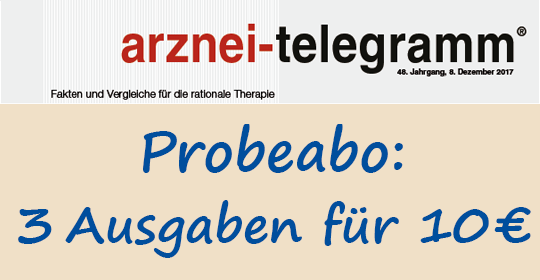Translation of a-t 2019; 50: 14
IN BRIEF
Falsified laboratory test results due to biotin (e.g. BIOTIN BETA) - this is largely unknown and may have serious consequences
Taking biotin ("vitamin B7", "vitamin H") can lead to false positive or false negative laboratory test results. The tests affected are those in which biotinylated reagents are used, for example, for the detection of thyroid and sex hormones or cardiac markers such as troponin T.* False and delayed diagnoses, as well as unnecessary treatments, can be the consequences of this. Due to an increased number of reports of such cases, the Bundesinstitut für Arzneimittel und Medizinprodukte (BfArM, Federal Institute for Drugs and Medical Devices) has initiated a risk assessment procedure at the European level (1). It is only necessary to take biotin in rare cases of biotin deficiency or, for example, in cases of congenital defects in biotin metabolism. As a rule, the daily requirement of 0.03 mg to 0.06 mg biotin is obtained from food (1). However, biotin is also touted as a dietary supplement to boost metabolism or as a "beauty vitamin" for healthy skin, hair or nails. The doses recommended for such purposes are sometimes substantially higher than the daily requirement, for example they can be 10 mg/day (1), which corresponds to the highest dose listed (for the treatment of very rare multiple carboxylase deficiencies) in the summaries of product characteristics (SPCs) for finished medicinal products. Indications concerning a potential influence on laboratory values are lacking in the SPCs (e.g. 2). In the instructions for performing the laboratory tests that are affected, threshold values for biotin concentrations are specified, below which no or only slight changes in the results are to be expected. However, this is of little help in routine clinical practice, since correlations between biotin intake and plasma levels have not yet been established (1). It is therefore not clear from which dose it is necessary to take into consideration an influence on laboratory tests. For example, falsely low TSH values are described, on account of which treatment with radioactive iodine is considered, already at a daily dose of 0.3 mg biotin (1,3). A patient in the USA, who took high dose biotin in an attempt to treat multiple sclerosis**, died after presenting in the emergency department with chest pain. The possibility of myocardial infarction was not given timely consideration due to a falsely negative troponin value (4,5). Both the US drug agency FDA and BfArM employees advise asking patients scheduled for laboratory tests specifically about whether they take biotin-containing medication and dietary supplements and considering the possibility of interference if there is a discrepancy between a test result and clinical symptoms. Since the risk of false results due to biotin depends on the principle of the test being used, and thus can differ from one laboratory to another, the possibility of false results due to biotin should be mentioned in laboratory results when biotinylated reagents are used (1,4).
| 1 | KATIC, J., BICK, N. (BfArM): Bull. zur Arzneimittelsicherheit 2018; No. 4: 12-9; http://www.a-turl.de/?k=berz |
| 2 | Heumann: SPC BIOTIN HEUMANN, as at March 2015 |
| 3 | CHARLES, S. et al.: Nutrition 2019; 57: 257-8 |
| 4 | FDA: Safety Communication, 28. Nov. 2017; http://www.a-turl.de/?k=rmtr |
| 5 | FDA: MAUDE adverse event report, Jan. 2017; http://www.a-turl.de/?k=enna |
| 6 | EMA: Withdrawal Assessment Report QIZENDAY, Sept. 2017; http://www.a-turl.de/?k=osdo |
| * | See (1) for details of the test systems affected |
| ** | In Europe, the application for authorisation of high-dose biotin (300 mg/day) against progressive MS was withdrawn in 2017 due to insufficient data (6). |
© arznei-telegramm (Berlin/Germany), January, 2019, protected by copyright laws.
Autor: Redaktion arznei-telegramm - Wer wir sind und wie wir arbeiten
Diese Publikation ist urheberrechtlich geschützt. Vervielfältigung sowie Einspeicherung und Verarbeitung in elektronischen Systemen ist nur mit Genehmigung des arznei-telegramm® gestattet.
